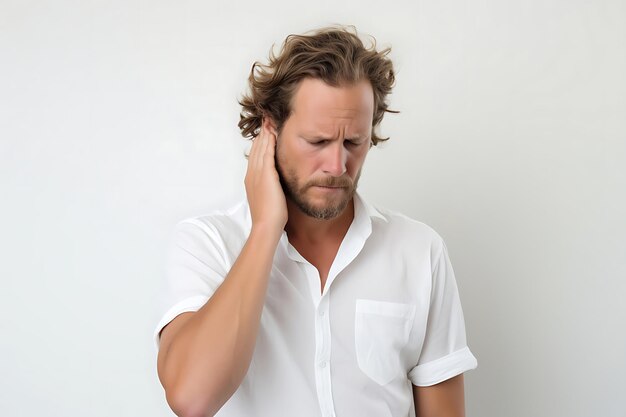Can an Earache Trigger Vertigo? Unpacking the Connection Between Ear Health and Balance
If you've ever experienced an earache and suddenly felt the world spinning around you, you might have wondered: can an earache cause vertigo? This strikingly vivid experience is more common than you might think, and it highlights the intricate connections within our bodies. Let's dive into how an earache could be linked to feelings of dizziness, exploring the underlying causes, symptoms, and practical steps you can take.
Understanding the Ear-Vertigo Link
An earache, or otalgia, is not just a routine annoyance. It's often the symptom of deeper issues within the intricate ear structures that can extend its effects to balance and spatial orientation. Vertigo, characterized by a spinning sensation and balance disruptions, can alarm and incapacitate its sufferers.
The Ear's Role in Balance
The ear plays a crucial role in our ability to maintain balance and spatial orientation. Most people are familiar with the outer ear's role in collecting sounds, but it's the inner ear where much of the magic happens.
- The Inner Ear Components: This includes the cochlea, responsible for hearing, and the vestibular system, which governs balance. Tiny structures within the vestibular system––the semicircular canals and otolith organs––detect head movements and gravity, keeping you steady.
When the ear is compromised, whether through infection, injury, or other conditions, this can interfere with its balance-regulating abilities.
How Earaches Lead to Vertigo
Middle Ear Infections (Otitis Media): Common in children, these infections can inflame and disrupt the eustachian tubes, leading to fluid buildup. Such disturbances can impact balance, causing dizziness or vertigo.
Inner Ear Disorders (Labyrinthitis and Vestibular Neuritis): These conditions specifically target the inner ear's balance structures. Inflammation here directly leads to vertigo, often accompanied by nausea or hearing loss.
Ear Wax Build-up (Cerumen Impaction): While it seems mundane, excess ear wax can apply pressure or cause temporary hearing loss, potentially influencing balance.
Trauma or Injury: Sudden changes in air pressure, head injuries, or loud noises can injure the inner ear, sparking vertigo symptoms.
Identifying Symptoms and Triggers
Understanding the symptoms that accompany earache-induced vertigo can help you identify these issues early on.
Common Symptoms
- Spinning Sensations: The hallmark of vertigo, where you're either spinning or the world is.
- Nausea or Vomiting: Often follows severe dizziness due to the imbalance.
- Hearing Changes: Ringing in the ears (tinnitus) or temporary hearing loss may occur.
- Ear Pain or Discomfort: Varies in intensity, often the first sign of an underlying issue.
- Imbalance or Unsteadiness: Difficulty walking or standing straight.
Potential Triggers
- Sudden Movements: Quick head turns or leaning over might exacerbate symptoms.
- Loud Noises: Exposure to high volumes can worsen the condition.
- Altitude Changes: Sudden changes, like during airplane take-offs, could spark ear pressure issues.
Navigating the World of Ear Health
When faced with earache-related vertigo, a better understanding of possible underlying conditions becomes crucial. Knowing what might be causing your symptoms helps in addressing them comprehensively.
Exploring Ear Conditions Linked to Vertigo
1. Meniere’s Disease
A chronic condition characterized by recurring episodes of vertigo, tinnitus, ear fullness, and fluctuating hearing loss. The exact cause is unclear, but the fluid buildup in the inner ear structures likely plays a role.
2. BPPV (Benign Paroxysmal Positional Vertigo)
One of the most common causes of vertigo, BPPV is triggered by changes in head position. It occurs when tiny calcium particles clump within the inner ear canals.
3. Eustachian Tube Dysfunction
If these tubes are blocked or aren't working properly, pressure in the ear can cause discomfort and imbalance. This can often accompany sinus infections or allergies.
4. Acoustic Neuroma
Though rare, this non-cancerous growth affects the nerve connecting the ear to the brain. Symptoms include hearing loss, vertigo, and imbalance.
Practical Steps for Relief and Prevention
Knowledge is power, and understanding your symptoms can lead you to practical solutions. Here are steps to consider when dealing with ear-related vertigo.
Managing Symptoms at Home
- Rest and Hydration: Rest can minimize dizziness, while proper hydration might reduce symptoms.
- Warm Compress: Applying warmth can soothe pain, especially from infections.
- Avoid Triggers: Identify and steer clear of environmental factors that may worsen dizziness.
When to Seek Professional Help
Persistent or severe symptoms demand professional attention. While home remedies can provide temporary relief, medical expertise ensures you tackle the root cause.
Key Indicators for Medical Attention:
- Prolonged vertigo spells lasting hours or days.
- Severe pain or a high fever accompanying earaches.
- Sudden hearing loss or continuous ringing in one or both ears.
Potential Medical Interventions
Doctors employ diverse strategies to address ear-related vertigo:
- Medications: Anti-nausea drugs, antibiotics for infections, or steroids for inflammation.
- Physical Therapy: Vestibular rehabilitation helps retrain the brain to balance better.
- Surgical Options: In cases of structural problems or severe conditions like Meniere’s disease, surgical intervention might be necessary.
Walking Forward with Confidence
Now equipped with a deeper understanding of how an earache can cause vertigo, you’re better positioned to handle these situations. Whether managing conditions at home or seeking medical advice, preparation is your strongest ally. Recognize the interconnectedness of your body’s systems and take proactive measures for your well-being. By nurturing and safeguarding ear health, you pave the way for improved balance and harmony in your everyday life.
Summary: Key Takeaways on Earache and Vertigo
- Balance & Ear Connection: The inner ear significantly influences both hearing and balance. 🦻
- Common Causes: Infections, fluid buildup, and injuries can trigger vertigo. 🔄
- Symptoms to Watch: Spinning, nausea, hearing changes, and pain are signs. 🚨
- Simple Relief Measures: Rest, hydration, and warmth can soothe minor symptoms. 🍵
- Professional Attention: Seek help for severe or persistent issues. 🩺
- Future Steps: Maintain ear health through proactive care and early intervention. 🌟

